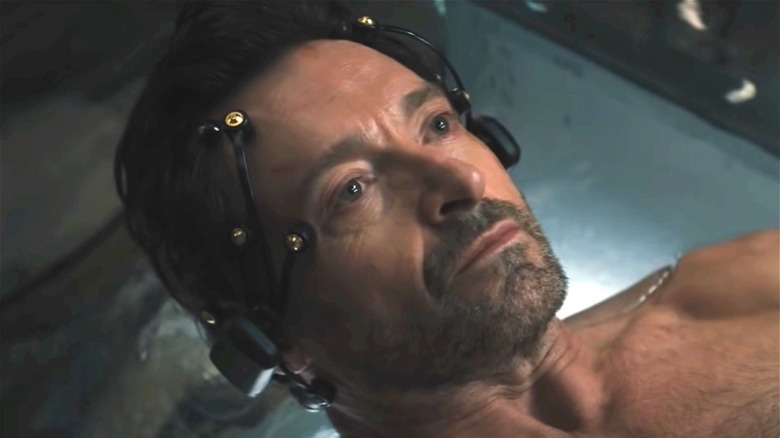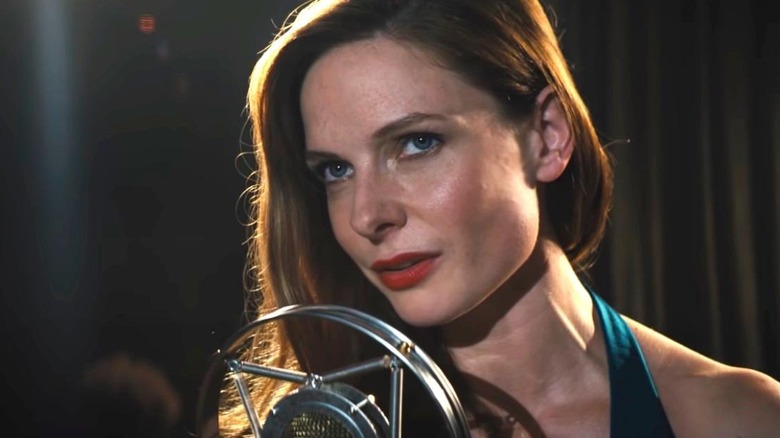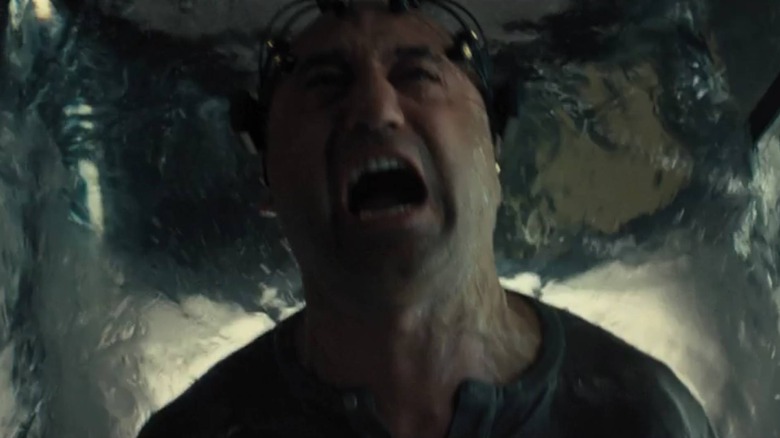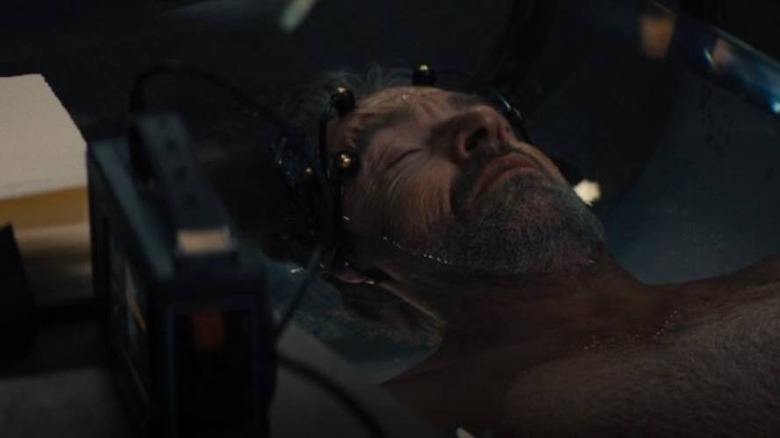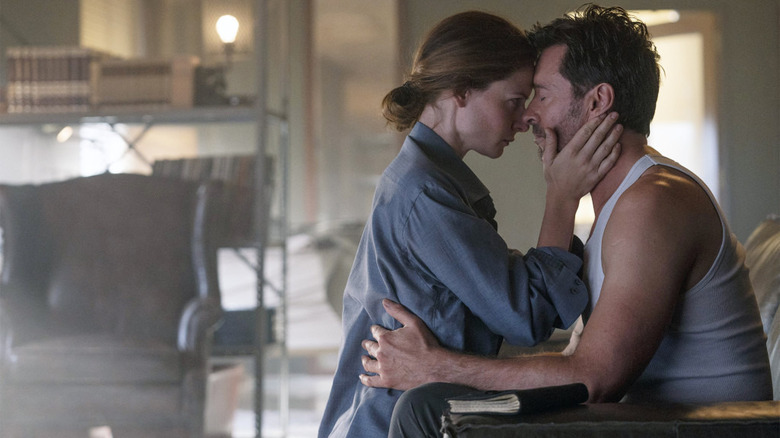The Ending Of Reminiscence Explained
Many great science-fiction films have dealt with the concept of memory. From "Total Recall" to "Eternal Sunshine of the Spotless Mind," the idea of what people remember and forget has always been an intriguing one to storytellers. After all, our memories are fragile, but they're arguably the most important thing we have access to in our minds. "Reminiscence" carries on this grand tradition by infusing it with a detective twist.
The movie follows Nick (Hugh Jackman), who works for a company that allows people to relive whatever memories they want due to the planet being a dystopian nightmare with extreme temperatures during the daytime and rising sea levels. One day, Mae (Rebecca Ferguson) enters the lab, and it doesn't take long for the two to fall in love. But when she mysteriously vanishes from his life, he'll resort to dubious methods to locate her by going into other people's memories to determine what happened to her.
It's one part film noir with one part hard sci-fi, and it leads to a finale that will leave your jaw on the floor. Here's everything you need to know about the "Reminiscence" ending.
What happened to Mae?
Nick goes on an emotional rollercoaster as he goes from one person's memories to the next, attempting to figure out what happened to Mae. He discovers she has a shady past as a drug addict who stole illicit substances from some immoral people in New Orleans. As a result of her indiscretion, she gets hired to take on a job involving acquiring a security code from Nick for a secured vault filled with valuables. But something strange happened: Mae developed genuine romantic feelings for Nick.
It comes as sweet relief for Hugh Jackman's character, as he started to believe she merely used him. The love between them was true, but Mae gave her life for the greater good. As we learn, the film's events were set in motion when wealthy Sebastian Sylvan (Mojean Aria) takes a hit out against his father's illegitimate child, whose existence threatens his inheritance. Only Mae knows where the boy is, and to prevent her memories from falling into the wrong hands, she inhales a bunch of drugs and then jumps to her death.
It proves to be a bittersweet ending to Nick's journey. On the one hand, he now has closure and the knowledge that what was between him and Mae was real. But throughout the film, he held out hope she was still alive. He wanted them to get back together, but that's impossible now. The only thing he can do at the moment is to inflict great pain on the one responsible for this ...
What did Nick do to Cyrus?
One of the bad people Mae got mixed up with is a crooked cop named Cyrus Boothe (Cliff Curtis). He's the final piece to the puzzle, as he shows Nick how and why Mae died. She wouldn't have lost her life if it wasn't for him, and in true morally gray fashion, Nick decides to torment him for his final few months.
This includes leading him on a journey to his worst memory that ended with him getting lit on fire, explaining the scars we've seen across his head from earlier in the film. To add further insult to injury, Nick cranks the voltage on the reminiscence device to near 100 volts. At the beginning of the movie, Nick told Mae that there was never a need to go past 30 volts to get a person to remember something. While he doesn't elaborate about what would happen with tripling the dosage, we'll go out on a limb and say it's not good.
In voiceover narration, Nick says how he worked with local law enforcement to avoid murder charges. From there, the ending of "Reminiscence" only grows more complex.
Why is Hugh Jackman old at the end?
Nick does the only thing he knows to do with the case solved — he traps himself in the past. As we discover, the voiceover narration we've heard throughout the film was recorded by Nick right before he put himself in the reminiscence tank. He guides himself through his entire relationship with Mae (the good and the bad), and the ending of "Reminiscence" is a flashforward. He's spent most of his adult life living in the past while his old co-worker, Watts (Thandiwe Newton), looks onward.
She chose a different path. She's now a grandmother, and instead of living in a bygone era, her sights are set on the future. As Watts puts it, "A long time ago, we both chose our endings ... I like to think that we both chose right of ourselves." Under certain circumstances, Nick appears to have a sad ending. After all, instead of going out into the world, he decides to stay looking toward the past. "Don't live in the past" is a message you can find in numerous books and movies, but "Reminiscence" offers a different theme — What if living in the past is all right?
A new spin on a classic myth
Nick brings up the Greek myth of "Orpheus and Eurydice" several times throughout "Reminiscence." The basic structure of the old story is that Orpheus and Eurydice were lovers, but Eurydice died (perhaps that could've given audiences a clue about Mae's fate, too). Orpheus descends into the underworld to bring Eurydice back to the world of the living, to which Hades agrees under the condition that as Orpheus walks back to his realm, he cannot look back to make sure Eurydice is following behind him. Right before he exits, he looks back, trapping Eurydice's soul in the underworld forever.
The message of the myth is clear: Don't look back. However, "Reminiscence" tries to do something different with the story's ending. Nick also chose to look back at Mae, and for a good portion of their relationship, he only saw her as a visage of who she truly was. Orpheus was left heartbroken, but Nick has found solace in this copy of a copy. Is it healthy to live in the past? As Watts said, "I like to think that we both chose right of ourselves."
Everyone's different, and offering comforting words about moving forward in life may not work for everybody all of the time. It's up to the audience to decide if Nick's ending is happy or sad. Regardless, his torment is over.
